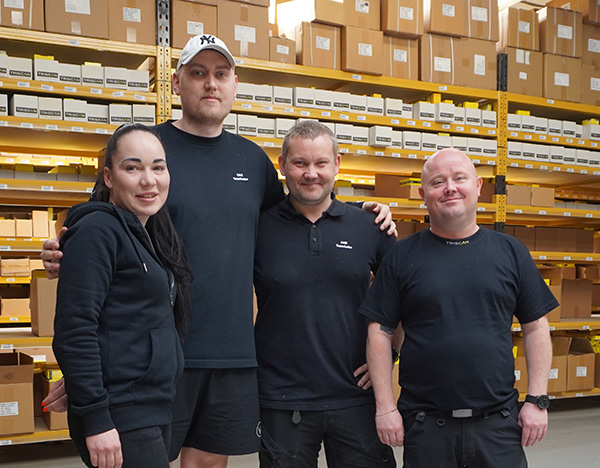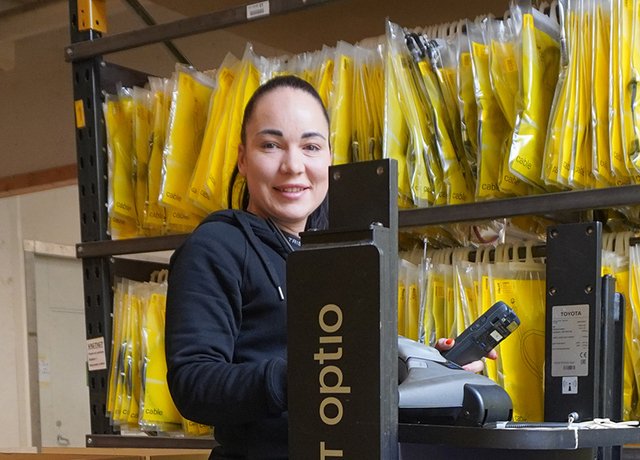Back in 2023, you could read about Elvira Batii, who in 2022 was employed by us as a warehouse employee. Now, more than three years later, Sif Roest from the Center for Job, Business Service and Integration in Aarhus, has visited Elvira and warehouse manager Søren Kaare Nielsen at Triscan, which has resulted in the following article.
By Sif Roest
Jobcenter Aarhus' Ukraine Job Task Force has gone on a follow-up visit to Triscan. A company located in Aarhus that supplies auto spare parts to wholesalers in more than 40 countries.
It has been 3 years since warehouse manager, Søren Kaare Nielsen, participated in a jobmatch event organized by Jobcenter Aarhus' Ukraine Job Task Force at Frydenlund School, which at the beginning of the war served as a Welcome House for Ukrainian refugees. Here, Søren met Ukrainian Elvira Batii, who was invited to the job match event and who he ended up offering a job on site. A match that was among the first between displaced Ukrainians and an Aarhus company, and which to this day has turned into a strong relationship. Ukraine Job Task Force has gone out to meet Elvira and Søren for a talk about their first meeting and what their collaboration looks like today.
The first meeting
In February 2022, the war in Ukraine breaks out. Shortly after, Elvira Batii flees to Aarhus with her son, who is now 15 years old. In Ukraine, Elvira is leaving behind an everyday life where she runs her own small shop. Elvira describes the first time in Aarhus as chaotic and confusing, but also clearly remembers how she desperately wanted a job so that she could support herself:
"It was my first priority to find a job so that I could support myself and my son. When you called and invited me to the job match event at Frydenlund School, I wanted to come, of course. I remember that it was raining heavily that day and I arrived in rubber boots and didn't quite know what to expect. I hadn't expected to get a job, so I was pleasantly surprised," says Elvira.
The first meeting is also keenly in the memory of Søren, who describes the conversation with Elvira as one that made an impression on him immediately:
"Elvira was the second last candidate I spoke to that day. I remember very clearly that I immediately thought that she was the right person for the job. Despite the fact that we could hardly communicate back then, as Elvira spoke neither Danish nor a very good English, I had no doubt that she had the right mindset and was a decent person with lots of potential. I fell for her energy and personality right away."
The language barrier
Although Elvira and Søren could not communicate much together at first, they made it work and slowly Elvira built up a larger vocabulary and was introduced to her work tasks as a warehouse employee. Søren describes how they translated task instructions with the help of apps and taught Elvira little by little – one task at a time. "It's important that you both want it to work and make an effort. I also think it was crucial that we made a concrete plan for Elvira's training and took it all in small chunks, so that she quietly gained confidence about one task before we moved on to the next one", explains Søren when asked what he thinks has been crucial for him and Elvira to have a strong collaboration despite the language barrier. They also both describe the trust between Elvira and Søren as a result of the fact that Søren and Triscan did a lot to help Elvira with practical things in connection with her arrival in Aarhus, as Elvira had neither a Danish CPR number (Civil Personal Registration) nor a bank account at the time. It took patience and an extra effort to get the hiring and onboarding of Elvira off to a good start, which created a strong foundation of commitment and trust between Søren and Elvira.

Elvira Batii with her colleagues (from left): Oliver Aude Skeldrup, Anders Nygaard Bjerregaard and Søren Kaare Nielsen
Elvira describes herself as "a bit of a straight-A student and perfectionist" with high expectations of herself and a desire to perform her work tasks in high quality. Søren elaborates on how Elvira has become a key employee at Triscan in three years, who not only solves her tasks in the warehouse, but also offers new ideas and a good mood. "Elvira quickly signed up for all the social events we held and quickly became part of the team. In three years, we have gone from using apps and gestures to communicate to her now being a key employee and valued colleague by everyone." The language challenges we had in the beginning took up some space for about 3 months, but then not much, so it was a really good investment. Elvira is both quick to learn and hardworking, and then the language barrier just takes up less space."
A new beginning in Aarhus
When asked what the job at Triscan has meant to Elvira over the past three years, she answers: "It has meant everything that I found a job so quickly that I am happy with. My life is divided into two – there is a "before" and a "post" war. I'm just trying to have a good everyday life where I can support myself and my son. I don't just respect Søren because he's my boss, but because of the person he is and I'm really grateful for everything he's done for me. I have a good everyday life with good colleagues and fun tasks:"
Elvira is practicing Danish, but both she and Søren admit with a smile that there is still some way to go before Elvira masters fluent Danish. Something Søren takes responsibility for contributing to:
"Yes, we have to admit that we have primarily spoken English together and Elvira has become much better! But we also need to get better at Danish, so that she can benefit from it outside the workplace as well. I have told her that we will start speaking more Danish and that by 2026 she will be able to communicate with us in Danish," Søren states with a smile.
When asked about the future, Elvira replies that she is very happy and grateful for her job and colleagues, that she has never had thoughts of changing jobs. The war has meant that long-term planning is no longer part of her mindset, but instead focuses on the present, such as her work and her son's well-being. "After the war, I have reassessed my entire value system and appreciate the little things and keep my focus on where I can contribute. I just dream of being happy, and I get that from being grateful for the little things in everyday life, my work, my colleagues and that my son is happy." Elvira elaborates.
Good advice for other companies
Every day, the Ukraine Job Task Force helps Ukrainian refugees enter the labour market and at the same time serves companies with everything from recruitment to onboarding and retention. An important part of retention is to support clear communication between employee and employer and contribute to concrete training in work tasks and understanding of the company's culture. Søren emphasizes these elements are important for the successful match: "The sooner you as a company can make an employee feel confident about solving work tasks, the better. It is crucial that you create security and small successes in the job through a concrete plan, because it gives you the confidence to solve your tasks and maintain motivation. The same goes for the employee: Don't have expectations of yourself that you should be able to do everything in 3 months but accept that it is an ongoing development that requires many small steps."
Søren's call to other companies that want to hire Ukrainian labor is clear:
"Emphasize the potential and personality, make a concrete plan for the training and accept that language development and integration into the company's culture and work tasks take time. It pays off!”








